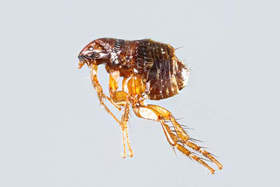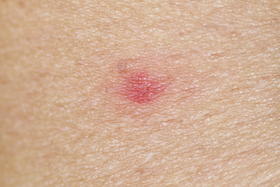
Flea Control & Removal
Fleas can quickly become an infestation without you knowing – until it is too late! Knowing that our pets can be susceptible to picking up fleas from other pets and from long grass, many people use a flea treatment regularly but, unless you use it exactly as you should, then fleas can become a problem.
Knowing you have a flea infestation is an uncomfortable thought, with many customers attempting to get rid of fleas with shop-bought products, too embarrassed to admit they have a ‘flea problem’. But we have dealt with many flea infestations and know only too well, they it can happen to anyone – cleanliness is not an issue!
The flea
There are several species of flea, but they are all small, 2 to 3mm in length and most are reddish brown in colour. They can be confused with bedbugs but fleas tend to jump or hop, whilst bed bugs crawl. Fleas also have a rounder body, whereas bedbugs are flat, almost disc shaped.
Adult fleas need a food source with humans, birds and animals – including your pet – being the perfect host!
But the bad news is they can lay dormant for up to 12 months and so people moving in to an empty property can inadvertently wake them up; attracted by both the vibration and the increased in CO2 we exhale, the fleas can suddenly spring back in to life.
How do you know you have a flea infestation?
There are several key indicators, including;
- Bites – fleas tend to bite the skin around the ankles, wrist and midriff, with the resulting spot looking like a raised heat lump. Some people have a mild reaction to flea bites, developing a rash as a result.
- Sighting – seeing an adult flea jumping around is a sure sign you have a flea problem
- Flea eggs or faeces – known as the ‘salt & pepper’ effect, you may see the white flea eggs or the black faeces
Where you will find fleas…
In a nutshell, soft furnishings from pet beds to your sofa, to carpets, bedding, clothing… anywhere that is warm, dark and close to a food source. Another site for fleas could be any abandoned bird nests within or around your home.
Getting rid of fleas: do shop-bought remedies work?
They can, but they need using correctly and in the right quantity, as well as an understanding of how fleas breed and their life cycle. People spend a lot of money on treatment, only to find that in a few months the infestation seems to have returned…
- Treating your pets – always consult your vet for the latest, up-to-date treatment for dogs and cats and follow the instructions carefully!
- Vacuuming – vacuum everything, from the sofa to carpets, rugs, not forgetting to really get into small nooks and crannies where eggs could be lurking (and don’t forget to empty the vacuum once completed)
- Hot wash – wash anything and everything that you can and at a temperature of at least 60° (if you can – always check the label)
- Freeze things – items that either cannot be washed at 60° or cannot be washed at all can be frozen; extreme cold also kills the eggs and any adult fleas etc. on items
- Treatment – there are powders and sprays that can be used to treat the home but can be expensive, with no guarantees that they will work (unlike our service!)


How we can help
Fleas are not an uncommon problem; we have helped hundreds of customers – domestic and commercial – be rid of fleas. We guarantee our work and know where the small insects can hide and lay eggs, meaning we do a thorough, effective job.
Not dealing with a possible flea infestation will only makes it worse; it will not resolve by itself and there is evidence that fleas are becoming increasingly common in the south of England (now spreading up the country). Many people blame the weather, assuming that the lack of cold winters, replaced by damp, cooler ones is causing this spread of fleas.
However, scientists now believe that the main culprit is the incorrect use of flea preventing treatments on dogs and cats, as well as possibly increasing flea resistance to some of the chemicals in the products.
As professional pest controllers and members of the British Pest Control Association, we are always up to date with the latest treatments to be used, meaning any flea infestation is quickly and effectively dealt with.
